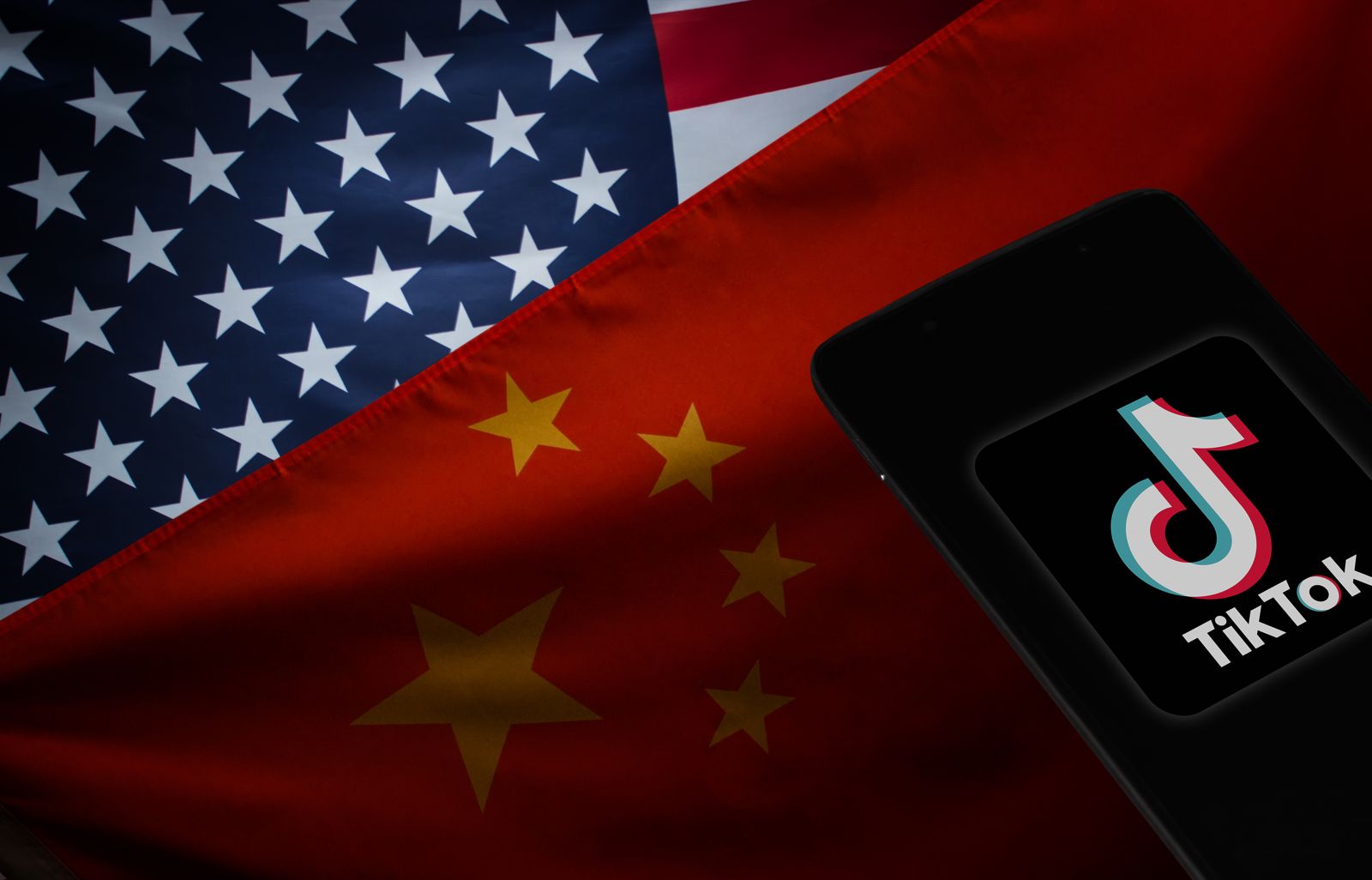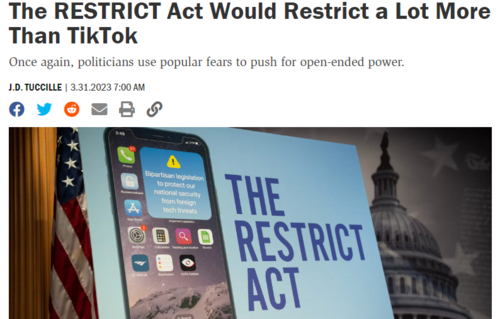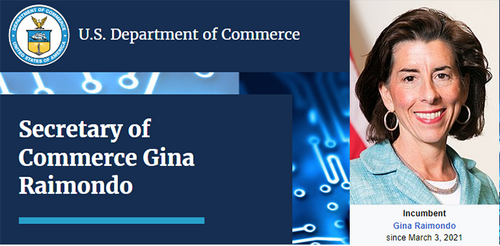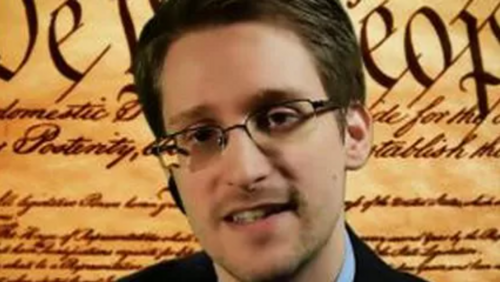The Censorship Industrial Complex Is At It Again With Another Trojan Horse

Just when you think things couldn’t get any worse regarding governmental control over online information, a recent US Bill aimed at reigning in the viral app TikTok has a strong chance of becoming law. In recent years governments worldwide have scrutinized TikTok due to its connections with the Chinese government. This scrutiny has escalated into calls for an outright ban of the social media app in some countries.
The targeting of TikTok is considered a ruse, as some governments are using this bill to ban TikTok as a trojan horse for unprecedented internet censorship. This article explores the various sections of the US bill, their real agenda, and what it means for us as citizens. But first, let’s look at the backstory of TikTok.

TikTok In Context
As mentioned, governments worldwide have been examining TikTok for some time due to its connections to the Chinese government. TikTok, owned by ByteDance, collects an incredible amount of user data. It gathers your name, age, phone number, contacts, location, images, videos, and everything you type, including the messages you send and receive. It can even access your camera and microphone, and it can do all of this even when you're not using the app.
According to TikTok surveillance mediators, they maintain that it's no different from being tracked and traced by an American tech company like, Google or Microsoft. The thing is that there are two significant differences. First, governments need permission to access user data in most Western countries. Secondly, and more importantly, this data is being shared with a foreign government that is the geopolitical rival of most Western powers.
Now, the other part of why there's been so much scrutiny about TikTok is the algorithm. There have been countless reports of TikTok feeding straight-up evil content to people in the West. Recent reports have focused on TikTok’s promotion of eating disorders and suicide.
Meanwhile, Douyin, China's version of TikTok, also owned by ByteDance, shows young people videos of things being built, discoveries being made, and other meaningful things being accomplished. In other words, it promotes the exact opposite kind of content that TikTok does in most Western countries. This is arguably an overt form of information warfare, and it begs the question of what should be done about it. Well, the simple answer is to ban TikTok.
Previous Calls For The TickTok Ban
The former US President, Donald Trump, famously proposed a TickTok ban in 2020. ByteDance initially agreed to meet Trump halfway by selling its US operations to Microsoft. This would keep all the app data collected in the US away from China, but the sale was unsuccessful after ByteDance rejected the offer.
However, US President Joe Biden ditched the TikTok ban idea when he revoked Trump's related executive order in 2021. At the time, the proposed ban was seen as political suicide due to the app’s popularity. But over the last year or so, US politicians have changed their view on TikTok.
TikTok Ban On Government Devices
The renewed calls to ban TikTok began late last year when the Biden Administration formulated the US government's $1.7 trillion spending bill for 2023. A provision to exclude TikTok from government devices is buried in the Bill, which is over 4,000 pages and was passed in December 2022. In the following months, close allies of the US, the UK, and the EU followed suit in banning TikTok from government devices.
This makes sense, considering that TikTok may be sharing sensitive information about these Western government devices with the Chinese government. Then on March 7th, 2023, Democrat politician Mark Warner and Republican politician John Thune introduced a bill titled “Restricting the Emergence of Security Threats that Risk Information and Communications Technology Act” or the “RESTRICT Act.”
The Trojan Horse
Keeping in mind that the bill is supposed to be about banning TikTok, White House National Security Advisor Jake Sullivan issued a statement applauding the introduction of the Restrict Act. He highlighted the widespread support the bill has received from politicians of both political parties. This means there's a high likelihood that it will become law, but it took people a couple of weeks to realize that the Restrict Act has almost nothing to do with banning TikTok.
People started to notice after TikTok CEO Shou Zi Chew testified before Congress, who took advantage of the opportunity to shill the Restrict Act. In the days that followed, the internet erupted with outrage over the bill's contents. Dozens of Twitter threads about these details went viral. Popular alternative media publications on both sides of the political spectrum published dynamic pieces opposing the “insanely broad provisions.”

Source: Reason.com
Not surprisingly, there was almost no coverage from the mainstream media; however, there was quite a bit of coverage from the crypto media because the Restrict Act could be used to ban crypto in the US. Many of the crypto headlines about the bill were about an article published by Coin Center, a crypto think tank based in Washington. D.C.
The article titled The Restrict Act creates blanket authority, with few checks, to ban just about anything linked to a ‘foreign adversary.’ In the article, the authors explained that the Restrict Act is comparable to a law passed in the 1970s, which prohibits Americans from transacting with sanctioned entities. The difference is that the Restrict Act would sanction transactions in which so-called foreign adversaries “have an interest.”
The act specifies that ‘interest’ includes “the provision of the technology or service.” This means that Americans could face fines and jail time for using cryptocurrencies if any mining or validation is done by an entity or country considered an adversary of the USA. And this barely scratches the surface of how ridiculous the Restrict Act is.
Louis Rossmann, a social media influencer and speaker of truth, breaks down the bill in more detail in this video, adding some significant context.
Dissecting The Restrict Act
The bill begins by specifying that all its powers will be given to the United States Secretary of Commerce. For context, the Secretary of Commerce is appointed by whoever happens to be the president at the time. The majority of senior US politicians approve of this appointment. Next, the bill gives some definitions, and some are worth highlighting.
The first is covered transactions; these are transactions in which a foreign adversary has any interest, as mentioned above. The Secretary of Commerce determines which entity is a foreign adversary. The second definition worth pointing out is critical infrastructure, and its meaning comes from the infamous Patriot Act.
The Patriot Act defines critical infrastructure in such a way that it can apply to basically anything that the government sees fit. The third definition is foreign adversary because it actually includes a few examples. It lists China, Cuba, Iran, North Korea, and Russia.
The next section of the bill deals with “Information and communication, technology products that pose an undue or unacceptable risk.” Once again, the Secretary of Commerce determines which information and technology pose a risk to the United States' national security.
The bill notes one risk as anything that could “undermine democratic processes and institutions or steer policy and regulatory decisions in favor of the strategic objectives of a foreign adversary.”
In other words, if you oppose the US government in any way, you're in big trouble. This ties into something in the seventh section of the bill: lobbyists will be allowed to advise the Secretary of Commerce as to which products and services should be labeled foreign adversaries and banned in the US. This would inevitably lead to a monopoly in every industry.

Image source: https://www.commerce.gov/
In section 11, the bill reveals exactly what fines and jail time Americans would suffer for interacting, in any way, with an entity deemed a foreign adversary or doing anything that could be labeled a risk to national security. It starts by saying that attempts to evade these laws are illegal and considered code for a crackdown on virtual private networks or VPNs. This was one aspect of the bill that went viral.
For reference, VPNs provide privacy when browsing websites and accessing foreign websites. Louis noted that the US government has been trying to ban VPNs for at least 15 years.
Then when it comes to the actual punishments, Americans can face up to $250,000 in fines for civil penalties. For criminal penalties, fines can be as much as $1 million or up to 20 years in prison and even result in the government seizing your assets—still no mention of banning TikTok.
But wait, there's more. In the 12th section of the bill, there's a sentence that reads,
“Actions taken by the secretary, under this act, shall not be subject to sections 551, 553 through 559, and 701 through 707 of title 5, United States Code.”
Louis looked up the sections in his video, discovering that the above statement means there's no oversight. Specifically, it will not be possible for Americans to submit Freedom of Information requests to understand why the Secretary of Commerce labels some entities as foreign adversaries or some activities as high risk.
As a cherry on top, neither Congress nor the courts can request information. These disturbing details are why the Restrict Act is referred to as the ‘Patriot Act for the Internet’ or Patriot Act 2.0. For those unfamiliar, the Patriot Act was passed in the aftermath of the 9/11 attacks in 2001. Its provisions permitted spying on everyone in the name of fighting terrorism.

Image Source: Reason.com
Notably, the Patriot Act was supposed to be temporary, but in 2013, an intelligence consultant named Edward Snowden blew the whistle on the ongoing surveillance. He also revealed that other governments worldwide are engaged in similarly extensive levels of domestic surveillance.
The Geniune Ban TikTok Bill
The Restrict Act Bill is causing a backlash against all the other bills trying to ban TikTok. This was apparent when Rand Paul blocked Josh Hawley's bill to fast-track his bill to ban TikTok.
In stark contrast to the Restrict Act, the originally titled “No TikTok on United States Devices Act” does actually ban Tick-Tock. More importantly, this bill doesn't have provisions that give the government more power. It's only four sections long and provides specifics about the TikTok ban.
Josh's arguments for banning TikTok are the same as the ones mentioned above. TikTok collects everything. It shares sensitive data with the CCP about journalists and politicians, and this ban has been a long time coming. He also revealed that TikTok has been lobbying against the ban.
Rand's reason for blocking Josh's TikTok ban was that it set a dangerous precedent for the US government to do the same to other apps it doesn't like. He also argued that it goes against the First Amendment (free speech) and that banning TikTok in the US is technically illegal. Rand then proclaimed that people have the ability to know what's good and evil and uninstall the app if they feel it's bad for them. He said that you should fear your own government, not China's, and asked if internet censorship is more dangerous than questionable content.
Josh retaliated by saying that the First Amendment doesn't protect China's ability to spy on US citizens. He also implied that TikTok’s lobbyists had paid Rand to block his attempt to fast-track the ban. This view is highly questionable as Rand is a Libertarian; he is cautious of all governments everywhere. Sadly, all the internet censorship laws being rolled out by governments globally could soon suppress his valid viewpoints.
TheTikTok Ban Debate. Should TikTok Be Banned?
Social media platforms like TikTok could be considered psychological drugs, and they come with unique benefits and risks. Suppose [they] ban this mental drug; the likelihood is that people will still find some way to get their hands on it. In this case, using VPNs and the like. This is a problem because [they] would lose oversight of how this drug is being used, and attempts to crack down on VPNs also wouldn't go over well and would be opposed.
What if this mental drug was allowed? It’s more likely that it will be relentlessly promoted by the individuals and institutions that profit from it. This is a problem because it would lead to excess consumption and give rise to the kind of extreme content that we see on most social media today. Instagram has effectively copied its video flow.
As such, the toxic algorithms would persist due to the perverse incentive structure that comes with legalization. The only thing you would have addressed is sharing user data with the Chinese government. Instead, it would likely be shared with the US government. Remember, the Patriot Act still exists.
The same outcome would occur if ByteDance were forced to sell TikTok to an American company. It would just be replacing the Chinese government with the US government. Sensitive data would still be shared, and given how the US government has been acting lately, that would be the same in practice.
The one thing this debate centers around is the government. An accurate consensus to end the discourse would be to get the government out of social media. Rand Paul is on the right track, but he and many others know it would be impossible while social media remains centralized.
The Solution To Subjugation
Society must be allowed to think for themselves and act accordingly. But we all know this is not what the ‘powers that be’ want. Truth be told, governments have reached a new level of corruption, deep-seated to the core. You may know that leaks from classified documents are emerging and broadcast over the internet, exposing their corruption and agenda.
The censorship industrial complex is weaponizing the leaks against citizens and corporations that do not comply with the globalist’s agenda. The Restrict Act they are trying to pass will serve as the weapon. The Internet is vast and way too sophisticated to be controlled. With the acceleration of technology, cryptocurrency, and decentralization on the move, nobody, not even the elites, can stop the truth from coming out.
The genuine and decentralized entities and social media platforms that have diverged from government-controlled legacy media that support “we the people” are a sanctuary from the evil in this world. There will always be a way to circumvent the oppression [they] are trying to orchestrate. As explained in this video, they are behind all the woke trends and ideologies they want to enforce, destroying our traditional God-given social culture.
Know that things are falling apart for these mega-corporations and so-called rulers as they scramble to keep their secrets and cover-ups hidden from us, dating back decades if not centuries. Be safe in the knowledge that the Divine source, a higher power, is at play to bring humanity into a new golden age.

Also published @ Substack.com
Bruce Jacobs


(26).gif)